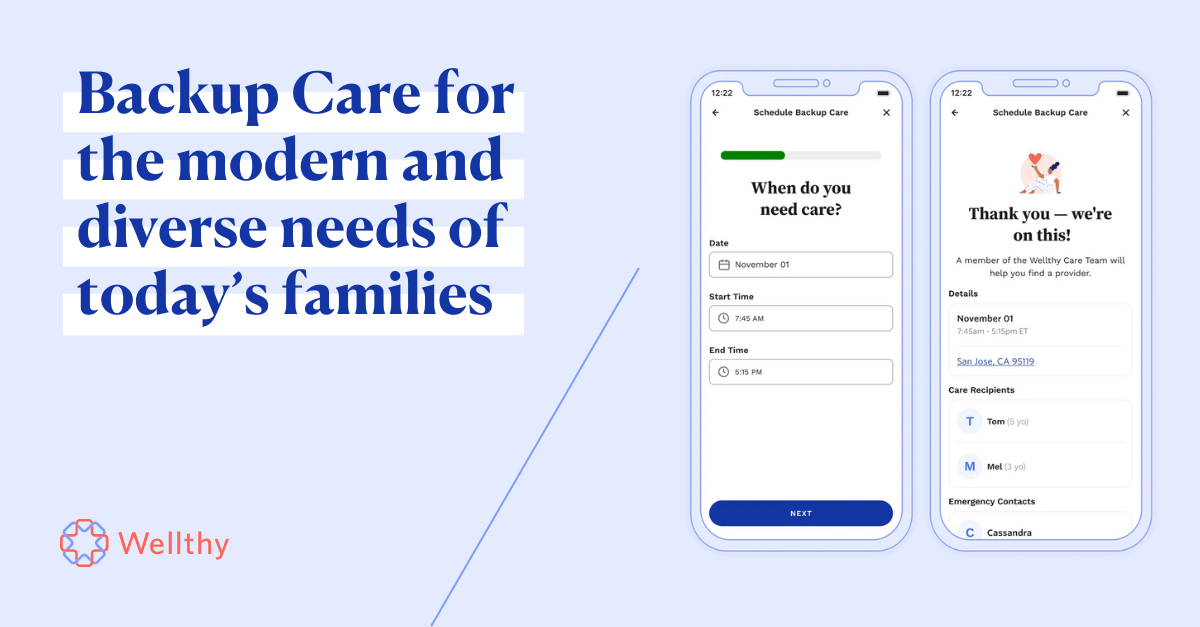With our Care Expert Spotlight series, we’re taking a peek into the lives of Wellthy's amazing care professionals.
This month we spoke with Katharine Arburn, a Care Coordinator specializing in childcare and special needs projects. Wellthy’s team of Care Coordinators and Advisers work directly with families to understand their care needs, create a care plan, prioritize tasks, and get things done on their behalf.
What is your background in?
I have been a Care Coordinator at Wellthy for 2.5 years and my background is in a variety of work. I have my bachelors in psychology and masters in K-12 school counseling. I used to work at my local DHS office processing food stamp and Medicaid applications, where I gained a lot of knowledge on Medicaid eligibility for seniors.
Using my school counseling degree, I worked as a behavioral therapist for kids with autism. In my career, I have learned about child development and have provided in-home behavioral therapy for children. As a behavioral therapist for children, I saw just how all-consuming it can be to be a caregiver for a child with special needs. Most of the families I worked with only had one parent working because the other parent was so busy managing appointments and anything else their kid needed.
What is your personal caregiving story?
Growing up I was a caregiver for my mom – my parents separated when I was young. She had children when she was pretty young, so as a teenager I spent a lot of time caring for her. Anything that she didn’t grow up learning how to do, I did – managing the household, making sure bills were paid, tagging our vehicles, etc. At the time I didn’t think of myself as a caregiver, but looking back, that was very much a caregiving role.
My father is also legally blind. I haven’t had to be as hands-on with him, but he struggles to see, even his cell phone. One thing I’ve always done for him that I didn’t realize wasn’t normal, is I’ve always automatically read restaurant menus to him. When I started working at Wellthy, I began to understand that caregiving isn’t just physically feeding, bathing, and dressing someone. It’s a lot broader than that. My parents don’t have life-consuming conditions, but I have to do things for them on a day-to-day basis that most people don’t, and those tasks do count as caregiving. I think it’s important for people in caregiving roles to realize that their work counts.
What inspires you to work in caregiving?
I’m really driven by wanting to help others live the best life possible using the tools they have and sharing tools that I have. I am an educator at heart and enjoy helping people feel more prepared and succeed. There’s so much education needed around caring for seniors related to long term care, insurance, Medicare coverage, and what to expect out of an assisted living facility. I really like helping people plan and prepare and that I’m able to help people with different financial struggles and medical bills. I grew up with a lot of financial insecurity, so being able to help process families’ bills correctly or even get them forgiven completely is really rewarding for me.
What have members’ reactions been from working with Wellthy?
Our services give our members a lot of their time back. A lot of the members we support have very busy and demanding jobs, and then they have to support immediate and extended family on top of that. Being able to take even just a few tasks off their plate and just trust us that they will be taken care of gives them that brain space to focus on what’s right in front of them.
What is one of the most memorable stories you have from working with a member?
One member I worked with opened a Care Project after receiving a life-changing diagnosis that would require weekly infusion treatments. He didn’t open the Care Project with any specific intention – he was just looking for emotional support and trying to see what, if anything, we could do for him. Treatment was going to cost thousands of dollars for the medication he was being prescribed, so cost was a big stressor for him. The first thing I did was find that this medication had a copay assistance program, reducing the amount he would have to spend. I was really excited to share this with him! This allowed him to focus less on the cost and more on how he was going to cope and live with this new diagnosis.
When should you ask for help?
While it depends on who you’re caring for and what situation you’re in, here are a couple times I’d recommend asking for help:
- When you need help with the coordination (i.e. making phone calls) or other basic tasks that take up time
- When you start a new job – you probably have new insurance, so it’s good to make sure all of your existing providers are still covered by your insurance
- Anytime you get a medical bill and you feel like it’s not accurate
- Generally, whenever you’re looking at caring for senior parents, the earlier the better – get an idea of the cost now and how to address it
What are some steps you’d recommend families take to set themselves up well for a future care situation?
In the realm of aging parents, you absolutely need to make sure you have these estate planning documents prepared:
- Power of attorney (POA)
- Healthcare POA
- Will
You do NOT want your parents getting hurt or have cognitive decline more quickly than you expect before they can sign those documents. If that happens, you have to go to a judge to get these things put in place, which is much more expensive and time-consuming than printing off free documents and having them notarized at the bank. There is no “too soon” for this. Starting early also gives you time to shop around if you need to and save money.
Tell us something about yourself that not many people know.
When I was in high school, my mom was the general manager of a gas station. Teens would often come in trying to buy cigarettes. At that age, I was really interested in law enforcement, so I called the Arkansas Tobacco Control Board and got a job where a cop and I would do compliance checks. I’d try to buy cigarettes and if the gas station served me, they would get ticketed.







